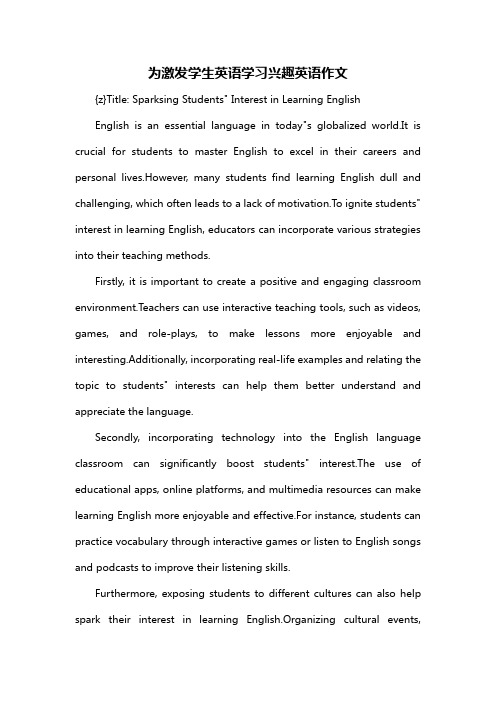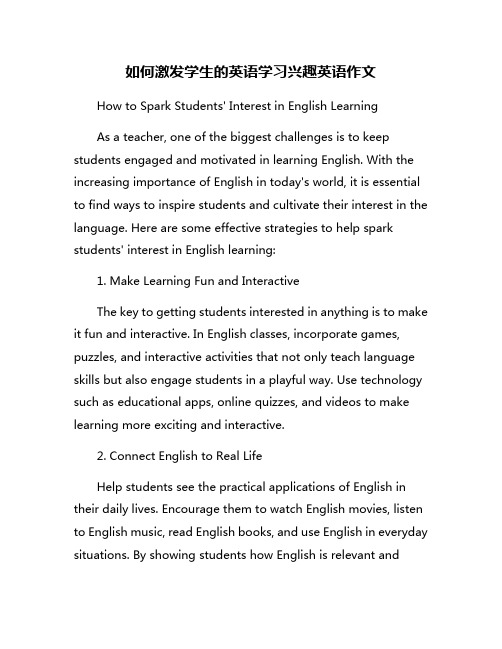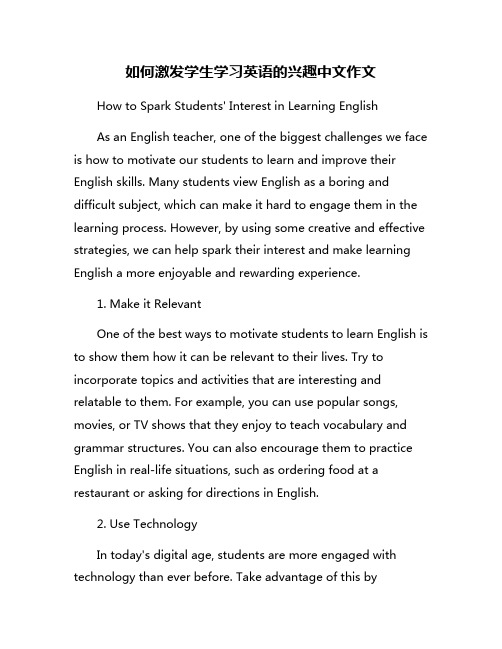让学生“愿学”英语课对策论文
为激发学生英语学习兴趣英语作文

为激发学生英语学习兴趣英语作文{z}Title: Sparksing Students" Interest in Learning EnglishEnglish is an essential language in today"s globalized world.It is crucial for students to master English to excel in their careers and personal lives.However, many students find learning English dull and challenging, which often leads to a lack of motivation.To ignite students" interest in learning English, educators can incorporate various strategies into their teaching methods.Firstly, it is important to create a positive and engaging classroom environment.Teachers can use interactive teaching tools, such as videos, games, and role-plays, to make lessons more enjoyable and interesting.Additionally, incorporating real-life examples and relating the topic to students" interests can help them better understand and appreciate the language.Secondly, incorporating technology into the English language classroom can significantly boost students" interest.The use of educational apps, online platforms, and multimedia resources can make learning English more enjoyable and effective.For instance, students can practice vocabulary through interactive games or listen to English songs and podcasts to improve their listening skills.Furthermore, exposing students to different cultures can also help spark their interest in learning anizing cultural events,exchange programs, or virtual field trips can provide students with the opportunity to learn about different countries and their languages.This not only enhances their language skills but also broadens their horizons.Moreover, assigning meaningful and relevant projects can motivate students to learn English.For example, students can create presentations on topics they are passionate about or write letters to pen pals abroad.Such projects not only improve their language skills but also make learning English more purposeful.In conclusion,激发学生学习英语的兴趣是至关重要的。
促进学生学习英语的方法(中学英语教学论文)

促进学生学习英语的方法 (中学英语教学论文)1、鼓励学生学习英语。
我国加入wto,与国外交往日益增多。
英语是通向21世纪的第一护照。
各类公司和企业都喜欢雇用有一定英语能力的人。
英语水平越高,取得成功的机会越多。
2、激起学生的兴趣和热情。
一方面我们尽量培养学生对新知识的兴趣,训练他们听说能力,使用大量的图片、实物、手势,创设语境来组织教学。
另一方面,我们注重问题的设计,促使学生自学,小组讨论,并给予适当的引导,这些对培养和激活学生学英语的兴趣和热情起重要作用。
此外,我们要降低难度,把新知识分成几个层次,确保所有学生都能加入到课堂活动中。
当学生发现他们能把所学的知识派上用场,他们的兴趣和信心就会迅速增长。
3、培养良好的品质和学习习惯。
我们必须努力增强学生学好英语的信心,扫除他们使用英语的心理障碍。
鼓励他们在英语练习中成为主体,让他们积极地参与英语活动,有更多的机会使用英语。
他们取得任何进步,教师都应表扬,当学生看到自己有所进步,他们就会更愿意练习。
此外,我们要指导学生形成良好的学习英语的习惯。
例如,教他们用词典,培养他们的阅读能力,指导他们在练习听力时学会做笔记。
根据学生的不同特点因材施教,根据记忆规律和遗忘曲线理论及时安排复习。
4、培训更多合格教师目前教师仍旧大量使用传统的教学方法,而不是交际教学法,因为很多教师对后者知之甚少。
培训的重点在于使教师科学安排教学内容和复习,重点放在指导学生上。
教师要善于根据学生的生理、心理发展和英语学习规律,进行有效的英语教学。
我们可以使用现代教学设备,创造生动的语言环境,鼓励学生参与,来逐步训练学生灵活使用语言的能力。
5、创造学习英语的环境。
语言环境是语言学习过程中的重要因素,我们可以把英语学习氛围渗透到学生的学习、生活、休息娱乐和各种课外活动中。
让学生尽可能多地接触英语,并在必要时给以适当的引导。
一)激发需要教师在教学时,先使学生产生学习某种知识的需要,然后进行教学;或者根据学生的需要来进行学习活动。
激发学生学英语的兴趣英语作文

激发学生学英语的兴趣英语作文In today's globalized world, the importance of learning English has become increasingly apparent. However, many students struggle to find motivation and interest in learning the language, often finding it boring and monotonous. As educators, it is our responsibility to create an engaging and exciting learning environment that sparks students' interest in English.One effective way to achieve this is through the use of innovative teaching methods. By employing creative and interactive techniques, we can make the learning process more fun and engaging for students. One such method is the use of technology in the classroom. By integrating digital tools and resources into our lessons, we can bring the language to life and make it more relevant to students' daily lives.For example, we can use educational apps and online platforms to deliver interactive quizzes, games, and simulations that allow students to practice their English skills in a fun and engaging way. These tools not only make learning more enjoyable but also provide instant feedback,allowing students to identify their areas of improvement and work towards enhancing their language proficiency.Another innovative teaching method is the adoption of a project-based learning approach. By assigning real-world projects that require students to apply their English skills, we can help them see the practical value of learning the language. For instance, students can be asked to create a travel brochure in English, or to present a research paper on a topic related to their interests. These projects not only help students develop their language skills but also foster their creativity and critical thinking abilities.Moreover, it is crucial to create a classroom environment that is conducive to learning and encourages active participation. This can be achieved by fostering a positive learning culture where students feel comfortable asking questions, sharing their ideas, and collaborating with peers. Teachers can also encourage students to participate in group discussions and role-playingactivities that help them practice their speaking and listening skills in a safe and supportive environment.Additionally, it is important to recognize and celebrate students' achievements. By acknowledging their efforts and progress, we can boost their confidence and motivation to learn English. Teachers can implement a rewards system that recognizes students for their participation, accuracy, and creativity in English-related activities.In conclusion, sparking students' interest in learning English requires a conscious effort from educators to create an engaging and exciting learning environment. By employing innovative teaching methods, integrating technology into the classroom, adopting a project-based learning approach, fostering a positive learning culture, and recognizing students' achievements, we can foster a love for learning English that will benefit students throughout their academic and professional careers.**激发学生学英语的兴趣:创新教学方法的力量** 在当今全球化的世界中,学习英语的重要性日益凸显。
如何激发学生的英语学习兴趣英语作文

如何激发学生的英语学习兴趣英语作文How to Spark Students' Interest in English LearningAs a teacher, one of the biggest challenges is to keep students engaged and motivated in learning English. With the increasing importance of English in today's world, it is essential to find ways to inspire students and cultivate their interest in the language. Here are some effective strategies to help spark students' interest in English learning:1. Make Learning Fun and InteractiveThe key to getting students interested in anything is to make it fun and interactive. In English classes, incorporate games, puzzles, and interactive activities that not only teach language skills but also engage students in a playful way. Use technology such as educational apps, online quizzes, and videos to make learning more exciting and interactive.2. Connect English to Real LifeHelp students see the practical applications of English in their daily lives. Encourage them to watch English movies, listen to English music, read English books, and use English in everyday situations. By showing students how English is relevant anduseful in real life, you can motivate them to learn and improve their language skills.3. Personalize LearningEvery student is unique and has different interests and learning styles. To spark students' interest in English, personalize their learning experience by incorporating their interests and hobbies into lessons. For example, if a student loves sports, use sports-themed activities or articles in English to make learning more engaging for them.4. Create a Positive Learning EnvironmentA positive and supportive learning environment is essential for fostering students' interest in English. Encourage students to express themselves freely, make mistakes without fear of judgment, and celebrate their progress and achievements. By creating a safe and encouraging atmosphere, students will feel more motivated and confident in their English learning journey.5. Set Clear Goals and RewardsHelp students set clear goals for their English learning and provide rewards or incentives for reaching those goals. Whether it's passing a test, participating in a class discussion, orcompleting a project, rewards can motivate students to stay focused and committed to improving their English skills.6. Encourage Peer CollaborationCollaboration with peers can make learning more engaging and enjoyable. Encourage students to work together on group projects, participate in discussions, and practice English conversation with their classmates. Peer collaboration can help students build confidence, learn from each other, and develop effective communication skills in English.7. Incorporate Cultural ActivitiesLearning about English-speaking countries' culture can make English learning more interesting and meaningful. Organize cultural activities, such as celebrating holidays, festivals, or traditions from English-speaking countries, to expose students to different cultures and enhance their understanding and appreciation of the language.In conclusion, sparking students' interest in English learning requires creativity, flexibility, and dedication. By incorporating fun and interactive activities, connecting English to real life, personalizing learning, creating a positive environment, setting clear goals, encouraging peer collaboration, and incorporatingcultural activities, teachers can inspire students to engage with English and achieve success in their language learning journey.。
英语论文浅议如何激发学生学习英语的兴趣

工欲善其事,必先利其器。
《论语·卫灵公》汪美云新疆阿克苏农一师四团中学843300兴趣是成功之母,英语学习更是这样。
多年来的教学实践,使我深深感受到学生学习英语的兴趣,直接影响到他们英语成绩的提高,并对他们今后进一步的学习和发展都具有重要的影响。
因此如何激发学生学习英语的积极性是极为重要的。
下面我就浅谈一下自己的教学体会:1.采用直观教学法直观教具最能吸引学生的注意力,激发他们的学习兴趣。
因此,我在教学英语单词,句型时,尽量运用形象,生动的语言,来激发他们听课的兴趣,然后再结合实物,挂图、幻灯、简笔画来激发他们的视觉兴趣。
例如:在学习Unit2Wucary:Yes,please .IWantasweater……使学生感到身临其境,似乎忘记自己是在学习,这样不知不觉中就掌握了知识,熟练了句型,对话并能应用于实际,兴趣极浓。
4.让学生做学习的主人我认为教学要以学生为主体,注重以人为本。
所以我尽量把英语学习的主动权交给学生,给他们营造宽松愉悦,积极向上的课堂氛围,鼓励每一名学生多说、多练、多听、多写,教师起到真正的主导作用,在英语知识的海洋里,老师是舵手,那么学生就是学习的主人,教师不再是板着面孔的导师,而是学生们的合作者、朋友、激励者和引路人。
总之,我认为学生身上的闪光点很多,我们教师要善于抓住他们各自的闪光点,要多鼓励、多表扬,使其增强学习信心再采取适当有效的教学方法,这样就能更好地激发他们学习英语的兴趣。
由于自己和学生们的不断努力。
我所教过班级学生的英语成绩,始终是名列前矛,在升入高中和大学后他们的英语成绩更是百尺竿头更进一步。
因此受到了领导、师生和社会的一致好评。
这一切都使我倍受鼓舞。
在今后的英语教学工作中,我更要竭尽全力探索出更多,更好的方法来进一点激发每一名学生学习英语的积极性,更快地提高他们学习英语的能力和水平。
【素材积累】司马迁写《史记》汉朝司马迁继承父业,立志著述史书。
他游历各地,阅读了大量书籍。
浅谈培养小学生英语学习兴趣论文

浅谈培养小学生英语学习兴趣论文爱因斯坦说过:"兴趣是最好的老师"。
创造一个和谐融洽的师生关系才能让学生更好的学习。
以下是店铺分享给大家的浅谈培养小学生英语学习兴趣论文的资料,希望可以帮到你!浅谈培养小学生英语学习兴趣论文篇1"语言这东西,不是随便可以学好的",学本族语如此,学习英语更是如此。
但是如果教学得法,便可事半功倍。
要取得这样的好效果,趣味教学可以说是一种好方法。
爱因斯坦说过:"兴趣是最好的老师"。
创造一个和谐融洽的师生关系;轻松、愉快的学习环境;采用灵活多变的教学方法,让学生做中学,学中用,从而激发兴趣,学得主动,提高效率。
一个成功的英语教师要在教学中有意识地培养学生对英语的持久兴趣,激励学生不断处于较佳的学习状态之中,使他们对英语乐学、善学、会学,学而忘我,乐此不疲。
因此,课堂教学手段必须不断更新,用灵活多样的教学方法,组织学生进行广泛的语言实践活动,通过多种手段激发学生实践的热情,加强对学生学习英语的兴趣的培养,让学生变兴趣为参与实践的动力,并在漫长的教学过程中始终保持这种兴趣,为语言实践活动提供源源不断的动力。
一、和谐、融洽师生关系。
教和学是一对矛盾,作为矛盾双方的代表教师和学生如何和谐融洽师生关系,对完成教学目的至关紧要。
青少年的心理特点告诉我们,这个年龄段的学生"亲师性"较强。
如果他们对某个老师有好感,他们便对这位老师的课感兴趣并分外重视,肯下大气力,花大功夫学这门课,因而成绩卓著。
这种现象大概就是我们常说的"爱屋及鸟"吧!反之,如果他们不喜欢某一位老师,由于逆反心理,他们也就不愿学或不学这位老师的课。
这种现象也是大家司空见惯的。
所以,教师要深入学生,和学生打成一片,了解学生的兴趣,爱好,喜怒哀乐情绪的变化,时时处处关心学生,爱护学生,尊重学生,有的放矢地帮助学生。
让你在学生的眼中不仅是一位可敬的师长,更是他们可亲可近的亲密朋友。
让学生更爱学英语几点建议论文

让学生更爱学英语的几点建议【摘要】为了学生们更爱学习英语,我们首先要解决的重要问题就是想办法调动他们学习英语的积极性。
本文从建立良好的师生关系,灵活运用有效的教学方法和教学手段和让家长动起来三个反面提出建议,提高学生学习英语的积极性。
【关键词】调动;灵活运用;提高许多家长和老师能够清晰地感到,英语的教学呈现两极分化,许多学生怕学厌学英语。
为了让我们的孩子们更爱学习英语,我们首先要解决的重要问题就是想办法调动他们学习英语的积极性。
下面浅谈一下我的几点建议:一.建立良好的师生关系这是调动学生积极性的前提条件。
这就要求我们既要尊重学生,又要热爱学生。
教师尊重孩子的需要,孩子就尊重教师的劳动。
我们要了解学生,要研究学生,因材施教。
抓住学生的年龄特点,灵活开发和运用教材。
教师要发挥自己的人格魅力,微笑是至关重要的。
“亲其师,信其道”。
和谐的师生关系会缩短师生的心理距离,加强友谊合作的桥梁,是激发学生学习的积极性、主动性、创造性的原动力。
二.灵活运用有效的教学方法和教学手段创设轻松、愉快的课堂气氛,学生在轻松愉快的环境中才会乐于学习英语,才会对英语学习表现出积极性。
这就要求我们要巧妙的设计教学环节,使孩子们能够融入其中,觉得自己是英语课堂中不可缺少的重要成员。
下面几点做法供大家参考:一)为了让课堂一开始就充满英语气氛,在教学中我坚持用英语组织课堂。
首先进行自由发言,让学生通过自由使用英语体验参与课堂学习的兴奋,让他们激动起来,自然就有了学习的兴趣。
二)运用情境教学法创设生活情境,使用多媒体呈现多种生活场景,让学生更直观地感受生活,学生很自然的回归到生活中,让他们觉得学习英语就是在学习生活。
学生对学习英语的目的有了更明确的认识,并能够把所学内容应用于生活。
三)使用游戏让学生在学习中充满乐趣。
有些小游戏可以让学生养成专注的习惯。
学生在学中玩,玩中学,不会感觉到厌烦。
我们还可以利用教具开展分角色表演。
看似很简单普通的教具,我们的学生表演起来却能更加的投入。
如何激发学生学习英语的兴趣论文

如何激发学生学习英语的兴趣论文如何激发学生学习英语的兴趣论文兴趣是最好的老师。
许多学生不愿意学习英语,关键是对英语不感兴趣。
孔子说:“知之者不如好之者,好之者不如乐之者。
”乌申斯基也曾指出:“没有任何兴趣,而被迫地进行学习,会扼杀学生的学习意愿。
”因此在教学过程中,要让学生轻松、愉快、主动、有效地学习,关键条件是必须培养学生的学习兴趣。
几年来,笔者在教学实践中围绕这一课题,与教研组的教师一起做了相关的探讨和尝试。
一、上好第一堂英语课第一节课十分重要,学生的注意力最为集中,任何一个细节都有可能引起他们的兴趣。
作为一名教师,要注意用生动、亲切的语言和表情去吸引每一个学生的注意力,教师是课程的“代言人”,得当的举止能够让英语在学生心中留下好印象。
可以从给学生起英文名字为课程的开始。
为了使大家相互了解,同时记住每个人的名字,教师在讲课时尽量用他们的英文名字称呼,在全班示范后,以同桌对话的形式练习,然后再用小组合作的方式扩大认识的范围,最后请学生站起来在全班采访,这样同学之间一下子就消除了生疏感。
同时,由原本上课都是“教师讲,学生听,全班围着教师转”的教学模式改为师生互动、生生互动的教学方式,既有个人发言,又有小组合作,这样的方式会让学生觉得新鲜、好奇,不再觉得45分钟难熬,甚至在课程结束时会有意犹未尽的感觉,使他们期待下节英语课的来临。
二、让学生动手操作对于初学者,直观教学尤其显得重要。
每一个学生都爱上劳动课,因为他们可以自己发挥自己的才能,制作有意思的东西。
在英语教学中,不妨发动学生自己动手。
以学习单词为例,可以让学生自己制作单词卡片。
首先,教师要提前布置任务,将制作好的统一规模的白色硬纸片发给学生,要求学生用彩笔把单词所指的事物画在纸片的'一面,再在背面写上图画所表达的单词及其音标。
一周后一些“作品”被运用在课堂上。
这样,学生在课外都兴趣盎然地制作图片,课上他们都期待着自己“作品”的出现。
()这样做意义已经超出画图本身,它让学生体会到成功,这种成功的喜悦大大激发了学英语的兴趣,使学生愿意上英语课。
怎样调动学生学习英语兴趣积极性论文

如何调动学生学习英语的兴趣与积极性兴趣是最好的老师。
每位教师都希望在自己的课堂上学生对所学知识感兴趣,并能积极投身到课堂学习活动中。
那么,怎样才能把课上的有趣呢?怎样才能充分调动学生的学习积极性呢?所谓课上的有趣,就是说:“学生带着一种高涨的、积极的情绪,进入学习和思考的状态,对所感知的内容有种需求感,并且通过积极的操作体验到成功的感受。
”在英语课堂教学中,教师应充分调动学生学习英语的兴趣和积极性,绝不能追求那种表面的,显而易见的刺激,以引起学生对学习和上课的兴趣,那你就永远不能调动起学生对所学科目的真正的兴趣与积极性。
本人从事初中英语教学已20余年,在教学实践中通过培养学生的学习兴趣调动学生学习英语的积极性,达到既教学生“学”,又教学生“行”的目的,取得了很好的实践效果。
一、活跃课堂气氛,激发学习兴趣教师在新授知识时,应经常让学生参与教学活动中,使他们在参与中提高兴趣,获取知识。
例如,在讲祈使句时,教师可以让学生听句子:stand up. open the window. touch your head…并用动作演示出来。
再如,让班内兴趣小组的学生当老师,把全班分成若干个小组,在规定时间内看哪组掌握得又快又好。
另外,教师还可以就新授内容向学生提问,让他们试着回答或说出自己的见解。
这样即可以促进学生积极地去预习、听讲,也活跃了课堂气氛,提高学生的学习兴趣,唤起他们的学习动机,使其全身心的投入到学习活动之中。
课堂的环境与气氛一定要有助于教与学,心理学研究表明“轻松、愉快、乐观的情绪能使人产生超强的记忆力,并且能够活跃创造性思维,充分发挥学生的心理优势,他们就能够接受新事物,学到新东西”。
冷冉同志曾说:“教师应教会学生以最好的情绪和态度,运用最好的方法去掌握知识和培养能力。
”简单地说,就是教会学生学习,培养学生的学习兴趣。
为了激发学生们学习英语的热情,教师应采用灵活多样的教学形式。
上课时要善于标新立异,勇于创新,让学生有新奇感。
小学英语精美论文-激发学习兴趣,打造小学英语高效课堂_通用版

小学英语精美论文-激发学习兴趣,打造小学英语高效课堂_通用版学生学习兴趣的培养是多方面的,是在一定条件的影响下发展的,在发展过程中又会有变化,而且影响变化的因素又十分复杂,所以兴趣会出现反复,这是很自然的现象。
最重要的是教师要随时注意学生学习兴趣的反复,及时采取有效措施,不断激发他们学习英语的兴趣,让学生从心底里爱英语,更好地学习英语。
【一】充分利用课前3分钟,唤起学生注意长期的教育教学实践让我充分地感觉到,一节课开始的最初几分钟是学生注意力极不稳定的时候,多数学生的心理仍处于上节课或课间活动的兴奋中。
因此,为了让学生尽快地进入到英语学习的氛围中来,一般情况下,我都会提前几分钟进教室,和学生们一起〝活动〞起来。
如:每天必有的值日生汇报制,要求值日生用英语作自我介绍、表达自己的喜好;简单介绍家人、朋友或班级情况等等,旨在鼓励学生大胆地用所学英语进行实际的交际活动。
同时,结合本课时要学习的新课内容组织学生唱唱英语歌曲,讲讲英文小故事,说说英语绕口令,表演英语情景剧等内容丰富,形式多样的活动。
这样不仅将学生分散的注意力集中起来,也为每个学生提供了参与运用英语的机会,既加强了他们的口语运用,也进行了听力训练,使学生整体听说能力得以提高。
【二】积极为学生提供自主学习的时间和空间新课程标准要求树立〝以学定教,当堂训练〞的课堂教学理念,倡导实施〝先学后教,精讲精练〞的课堂教学模式,坚持以充分调动学生的学习积极性、充分发挥学生的主体作用、培养学生的自学能力为主要任务,这也是构建有效课堂、高效课堂的主要目标。
自主学习是听课前的一种预备工作,其着眼点是为学生自己〝更好地学〞,为教师〝更顺利地引导〞,为真正实现课堂的有效、高效打下基础。
以往的教学中,我一直认为作为城乡结合的我们的学生,没办法和能力进行课前的自主学习即预习,同时也认为小学英语很简单,没必要进行预习。
但随着对新课改思想和理念的进一步领会和理解,我觉得要实现高效课堂,促进教学发展,培养学生主体意识和能力,真正表达教师主导,学生主体作用,科学的预习必不可少的,同时通过预习也为学生的自主学习提供了时间和空间。
如何调动学生学习英语积极性论文

如何调动学生学习英语的积极性初中英语教学的目的是:激发和培养学生学习英语的兴趣,使学生树立自信心,养成良好的学习习惯和形成有效的学习策略。
通过听、说、读、写的训练,使学生获得一定的英语基础知识和形成一定的综合语言运用能力。
如何让学生学好英语知识,关键在于有一个好的教学方法。
什么是好的教学方法?能激发学生学习兴趣的方法就是最好的教学方法。
激发学生的学习兴趣,就是要使学生喜欢学习英语、爱学英语。
为了调动广大学生学习英语的积极性,我做了以下一些尝试:一. 鼓励学生,激发他们求知欲英语教学面临的第一个问题就是如何让学生开口讲英语。
初学英语的人都有怕讲错,怕人笑的心理,不敢开口。
教师从一开始就要帮忙学生排除心理障碍和思想顾虑,注意培养他们开口说英语的勇气和习惯。
“渴望得到夸奖和认可”是初中学生普遍存在的心理需要。
而学习上的夸奖和认可主要来自教师,教师便成了推动学生学习的“外部动力源”。
因此在教学过程中,要留心观察学生,充分肯定各类学生在英语学习中的变化和进步。
及时给以鼓励和表扬,激发他们产生新的求知欲。
学生在使用英语时难免要出错误,如果要求学生连贯地表达思想,那么可能会出更多的错误。
对于错误要做分析,那些影响交际活动的错误应该及时指正,次要的错误,可以另找时间专门讲解和指正。
实际上,许多错误随着学生在学习提高的过程中会自行改正的。
切不可频繁地打断学生的交际活动来纠正错误,这样会使学生不敢开口,过多的指责和批评往往会产生消极作用而适得其反。
二. 充分发挥教材的趣味性,通过“演、唱、画、游戏”等方式有效地激发学生的学习兴趣1.“演”表演是一种让学生熟练地掌握课文,增强运用学过的词句能力,提高口语水平的有效活动。
在介绍新的语言这一步骤中,教师是一位讲解员,也是一位表演者。
教师的讲解和表演越清楚生动,给学生留下的印象越深刻,要使学生处于轻松愉快,跃跃欲试的状态。
在对学生进行训练的过程中,老师则是组织者,也可说是一名导演。
如何激发学生学习英文的兴趣和活力英文作文

如何激发学生学习英文的兴趣和活力英文作文Cultivating a Passion for English: Strategies to Engage and Energize StudentsProficiency in the English language has become increasingly essential in today's globalized world. As educators, we are tasked with the challenge of fostering a genuine enthusiasm and dynamism within our students as they embark on their English learning journey. This essay will explore various strategies and approaches that can be implemented to ignite a passion for the English language and sustain students' academic vigor.Firstly, it is crucial to recognize that students' motivation and engagement are directly linked to the relevance and applicability of the content being taught. By incorporating real-world examples, current events, and relatable topics into the curriculum, we can demonstrate the practical value of English language skills. This not only piques students' interest but also encourages them to see theimmediate relevance of what they are learning. For instance, discussing news articles that highlight the importance of English in international business negotiations or analyzing popular movies and TV shows in the target language can help students understand the tangible benefits of mastering English.Moreover, fostering a dynamic and interactive learning environment is essential in sustaining students' enthusiasm. Incorporating a variety of teaching methods, such as group discussions, role-playing exercises, and multimedia presentations, can help maintain students' engagement and prevent the monotony of traditional lecture-based instruction. By actively involving students in the learning process, we can tap into their natural curiosity and encourage them to take a more proactive role in their own language acquisition.Another effective strategy is to cultivate a sense of achievement and progress within the students. Celebrating small milestones, such as mastering a new grammar concept or expanding their vocabulary, can instill a sense of pride and accomplishment. This positive reinforcement not only boosts students' confidence but also motivates them to continue striving for success. Providing regular feedback, constructive criticism, and opportunities for self-reflection can further empower students to take ownership of their learning and stay motivated.Additionally, incorporating elements of creativity and self-expression into the English curriculum can greatly enhance students' engagement and enthusiasm. Encouraging students to write short stories, compose poetry, or even produce their own multimedia projects in English can unleash their artistic talents and foster a deeper connection with the language. By allowing students to infuse their unique perspectives and personalities into their work, we can nurture a more personal and meaningful relationship with the English language.Furthermore, leveraging the power of technology and digital resources can significantly contribute to the vitality of English learning. Incorporating interactive language-learning apps, online platforms, and multimedia content can cater to the digital-native generation and provide a more engaging and immersive learning experience. These tools not only make the learning process more dynamic but also enable students to practice and explore the language at their own pace, fostering a sense of autonomy and self-directed learning.Finally, it is essential to foster a supportive and inclusive learning environment that celebrates diversity and encourages risk-taking. By creating a classroom culture that values mistakes as opportunities for growth and fosters a sense of community, we can empower students to step out of their comfort zones and embrace the challenges oflanguage learning. Encouraging peer-to-peer collaboration, facilitating open discussions, and celebrating cultural exchanges can further enhance the overall learning experience and cultivate a genuine enthusiasm for the English language.In conclusion, the task of igniting a passion for English learning among students requires a multifaceted approach that addresses both the cognitive and affective domains of the learning process. By incorporating real-world relevance, interactive teaching methods, a sense of achievement, creative expression, and a supportive learning environment, we can nurture a generation of students who are not only proficient in English but also deeply engaged and enthusiastic about their language learning journey. As educators, our role is to inspire, motivate, and empower our students to embrace the beauty and power of the English language, ultimately equipping them with the skills and confidence to thrive in an increasingly interconnected world.。
激发学生学英语的兴趣英语作文

激发学生学英语的兴趣英语作文Fostering Student Enthusiasm for Learning EnglishProficiency in the English language has become increasingly crucial in today's globalized world. As the international language of business, academia, and communication, the ability to effectively communicate in English opens doors to a wealth of opportunities. However, many students often struggle to maintain their motivation and enthusiasm for learning English, leading to suboptimal academic performance and a reluctance to engage with the language. As educators, it is our responsibility to cultivate an environment that nurtures a genuine passion for English language acquisition.One of the primary strategies in fostering student enthusiasm for learning English is to make the learning process engaging and relevant. Instead of relying solely on traditional textbook-based instruction, educators should incorporate a diverse range of activities and resources that cater to different learning styles and interests. This can include the use of multimedia, interactive games, and real-world scenarios that allow students to apply their language skills in practical contexts.For instance, teachers can incorporate the use of English-language films, television shows, or podcasts into their lessons. By exposing students to authentic language use in engaging and relatable formats, they can develop a deeper appreciation for the nuances and versatility of the English language. Additionally, incorporating project-based learning, where students work collaboratively to complete tasks or create presentations in English, can help them see the practical applications of their language skills.Another effective approach is to personalize the learning experience by encouraging students to explore topics and themes that align with their personal interests. By allowing students to choose their own reading materials, writing assignments, or research projects, they are more likely to feel invested in the learning process and motivated to excel. This, in turn, can lead to a deeper understanding and retention of the language.Fostering a supportive and inclusive classroom environment is also crucial in maintaining student enthusiasm for learning English. Teachers should strive to create a safe and welcoming space where students feel comfortable taking risks, making mistakes, and expressing themselves freely. This can be achieved through the use of positive reinforcement, constructive feedback, and opportunities for peer-to-peer collaboration and support.Furthermore, it is important to recognize and celebrate the progress and achievements of students, no matter how small. By acknowledging their efforts and successes, educators can boost their confidence and inspire them to continue their language learning journey. This can be done through the use of awards, certificates, or public recognition of their accomplishments.In addition to classroom-based strategies, it is also essential to encourage students to engage with the English language outside of the academic setting. This can include encouraging them to participate in extracurricular activities, such as language clubs, cultural events, or exchange programs, where they can practice their language skills in real-world contexts. Encouraging students to consume English-language media, such as books, music, or social media, can also help them develop a deeper connection with the language and its cultural aspects.Moreover, it is important to recognize and address the unique challenges that students may face in learning English, such as language barriers, cultural differences, or personal anxieties. By providing targeted support and resources, such as tutoring, language workshops, or counseling services, educators can help students overcome these obstacles and maintain their enthusiasm for learning.In conclusion, fostering student enthusiasm for learning English is a multifaceted endeavor that requires a combination of engaging instructional strategies, personalized learning experiences, supportive classroom environments, and opportunities for real-world language application. By adopting a holistic approach that addresses the diverse needs and interests of students, educators can cultivate a generation of confident and passionate English language learners, poised to thrive in the global landscape.。
如何让学生坚持学英语作文

如何让学生坚持学英语作文As a teacher, it is important to encourage students to persist in learning English composition. One effective way to achieve this is to create a supportive and motivating learning environment. Teachers can provide regular feedback and praise to students, which can help to boost their confidence and motivation in writing.In addition, it is important to make the learning process fun and engaging. Teachers can incorporate interesting and relevant topics into their writing assignments, which can help to capture the students' interest and make the learning process more enjoyable.Furthermore, it is important to set clear and achievable goals for the students. By breaking down the learning process into smaller, manageable steps, students can feel a sense of accomplishment as they make progress in their writing skills.Moreover, it is important to provide students with opportunities to practice their writing skills regularly. Teachers can assign regular writing tasks and provide guidance and support as students work on their compositions.Overall, by creating a supportive and engaging learning environment, setting clear goals, and providing regular practice opportunities, teachers can help students topersist in learning English composition. With dedicationand perseverance, students can improve their writing skills and become more confident and proficient in English composition.。
如何激发学生的英语学习兴趣作文

如何激发学生的英语学习兴趣作文Learning a new language can be a daunting task for many students. English, in particular, is a language that is widely spoken around the world, making it an important skill to acquire. However, inspiring students to develop a genuine interest in learning English can be a challenge for educators. In this essay, we will explore various strategies and approaches that can be used to ignite and sustain students' enthusiasm for English language learning.Firstly, it is crucial to understand the diverse motivations and learning preferences of students. Some may be intrinsically motivated, driven by a personal desire to improve their language skills for academic or professional purposes. Others may be more extrinsically motivated, seeking to meet the expectations of their parents or teachers. By recognizing these differences, educators can tailor their teaching methods to cater to the individual needs of their students.One effective way to inspire students' interest in learning English is by making the content relevant and engaging. Incorporating real-world scenarios, current events, and topics that align with students' interests can help them see the practical applications of the language. For example, instead of focusing solely on grammar exercises, teachers can encourage students to discuss current news articles or analyze popular media in English. This approach not only enhances their language skills but also fosters a deeper understanding of the world around them.Additionally, incorporating interactive and multimedia-based activities can significantly boost students' engagement. The use of technology, such as educational apps, interactive whiteboards, and online resources, can make language learning more dynamic and immersive. By incorporating these elements, educators can appeal to different learning styles and create a more stimulating learning environment.Another crucial aspect of inspiring students' interest in English is fostering a supportive and inclusive classroom atmosphere. When students feel comfortable, respected, and encouraged to take risks, they are more likely to actively participate and embrace the learning process. Encouraging a collaborative learning environment, where students can work together on projects or engage in peer-to-peer discussions, can help build a sense of community and shared ownership in the learning experience.Furthermore, providing frequent and constructive feedback can be instrumental in sustaining students' motivation. Acknowledging their progress, celebrating their achievements, and offering guidance on areas for improvement can help students feel valued and empowered. This approach not only boosts their confidence but also reinforces the idea that learning English is a journey, with both successes and challenges along the way.Beyond the classroom, incorporating extracurricular activities and language-learning opportunities can further ignite students' interest. Organizing language clubs, language exchange programs, or cultural events can expose students to the richness and diversity of the English-speaking world. These activities not only enhance their language skills but also foster a deeper appreciation for the cultural aspects of the language.It is also essential to recognize the importance of parental involvement in the language-learning process. Engaging parents and encouraging them to support their children's language-learning efforts can have a significant impact on students' motivation and progress. This can be achieved through regular communication, providing resources and strategies for parents to assist their children at home, and involving them in language-learning activities.Finally, it is crucial for educators to continuously reflect on theirteaching practices and adapt their approaches to cater to the evolving needs and preferences of their students. By staying informed about the latest trends and best practices in language education, and by actively seeking feedback from students, teachers can continuously refine their methods and ensure that their efforts to inspire students' interest in learning English remain effective and engaging.In conclusion, inspiring students' interest in learning English is a multifaceted endeavor that requires a combination of strategies and approaches. By understanding the diverse motivations of students, creating relevant and engaging content, incorporating interactive and multimedia-based activities, fostering a supportive and inclusive classroom environment, providing constructive feedback, offering extracurricular opportunities, and involving parents, educators can cultivate a genuine and lasting enthusiasm for the English language among their students. By adopting these strategies, we can empower students to embrace the challenges and reap the countless benefits of mastering the English language.。
如何激发学生学习英语的兴趣中文作文

如何激发学生学习英语的兴趣中文作文How to Spark Students' Interest in Learning EnglishAs an English teacher, one of the biggest challenges we face is how to motivate our students to learn and improve their English skills. Many students view English as a boring and difficult subject, which can make it hard to engage them in the learning process. However, by using some creative and effective strategies, we can help spark their interest and make learning English a more enjoyable and rewarding experience.1. Make it RelevantOne of the best ways to motivate students to learn English is to show them how it can be relevant to their lives. Try to incorporate topics and activities that are interesting and relatable to them. For example, you can use popular songs, movies, or TV shows that they enjoy to teach vocabulary and grammar structures. You can also encourage them to practice English in real-life situations, such as ordering food at a restaurant or asking for directions in English.2. Use TechnologyIn today's digital age, students are more engaged with technology than ever before. Take advantage of this byincorporating digital tools and resources into your lessons. For example, you can use educational apps, online games, and videos to make learning English more interactive and fun. You can also encourage your students to practice their English skills outside of the classroom by using language learning apps or watching English-speaking YouTube channels.3. Create a Positive Learning EnvironmentCreating a positive and supportive learning environment is crucial for motivating students to learn English. Encourage collaboration and teamwork among your students, and praise their efforts and achievements. Use positive reinforcement, such as giving out rewards or certificates for good performance. Make your lessons interactive and dynamic to keep their attention and make learning English more enjoyable.4. Provide Real-life OpportunitiesOne of the best ways to motivate students to learn English is to provide them with real-life opportunities to use the language. Encourage your students to participate in English-speaking clubs, language exchange programs, or study abroad programs. This will give them a chance to practice their English in a natural and authentic setting, which can be incredibly motivating and rewarding.5. Set Realistic GoalsSetting realistic and achievable goals is essential for motivating students to learn English. Break down their learning objectives into smaller, manageable tasks, and provide them with regular feedback and support. Celebrate their progress and successes along the way to keep them motivated and engaged.In conclusion, sparking students' interest in learning English can be a challenging but rewarding experience. By using creative and effective strategies, such as making English relevant, using technology, creating a positive learning environment, providing real-life opportunities, and setting realistic goals, we can help motivate our students to improve their English skills and achieve success in their language learning journey.。
小学英语论文-让学生主动参与英语学习的策略和方法通用版

小学英语论文-让学生主动参与英语学习的策略和方法通用版英语对于小学生来说具有一种极其神秘的吸引力,特别是低年级学生对英语学习大多怀有好奇、兴奋、期待的心情。
因此,教师要很好地把握住学生这种心理需求,根据儿童心理特点和年龄特征,采用丰富多彩的教学方法和教学手段,充分调动学生的主观能动性,启发、诱导、激发、激励和促进每一个学生主动参与英语学习,增强他们主动参与英语学习的意识。
让他们在参与英语学习的过程中实践、体验、合作与交流,从而消除学生对学习英语的恐惧心理和陌生感,激发和培养学生学习英语的兴趣,使学生树立自信心,为他们今后的英语学习打下良好的基础。
具体做法如下:一、直观教学,启发学生主动参与根据小学生心理发展特点,充分利用生动、形象的直观教学有助于学生直接感受和理解语言知识,激发他们的兴趣,通过视、听、说加深了形象,强化了记忆。
教学中,我尽可能地运用一切教学手段,引起学生的有意注意。
学字母时,让学生自制字母卡片,进行分组训练,玩找朋友和打扑克牌的游戏,也可以让学生上台做“人体字母”的游戏,即让一个或几个学生上台根据字母的形状用肢体作出字母。
单词教学时,可以利用实物、图片、简笔画等向学生出示,如:教apple, pear, banana, orange等水果单词时,可以把实物带进课堂,这样学生往往会产生一种新鲜感,注意力马上被吸引,有关方面的英语生词,在短短几分钟内就能记住,而且英语与实物之间建立了直接联系。
不便带进教室的实物(如:plane, car, monkey, tiger, panda等),可以用相应的图片、玩具或模型代替。
其次,简笔画也是最实用的直观教具之一,它能大大减少教师制作教具的时间,一支粉笔即可,而且信手拈来,富有动感,特别吸引学生。
直观教学缩短了英语与所表达事物之间的距离,加快了教学节奏,充分调动了学生的主观能动性,激发学生主动参与英语学习的积极性。
当然,直观教学的方法和手段还有许多,我们可以根据教学条件、内容、对象的不同来采取不同的方法和手段。
- 1、下载文档前请自行甄别文档内容的完整性,平台不提供额外的编辑、内容补充、找答案等附加服务。
- 2、"仅部分预览"的文档,不可在线预览部分如存在完整性等问题,可反馈申请退款(可完整预览的文档不适用该条件!)。
- 3、如文档侵犯您的权益,请联系客服反馈,我们会尽快为您处理(人工客服工作时间:9:00-18:30)。
探究让学生“愿学”英语课的对策摘要:学生只有做到“愿学”,才会做到“会学”、“快学”、“乐学”。
本文是笔者通过对自己英语教学的部分实践与见解进行整合,并提出了一些行之有效的让学生“愿学”英语的对策。
主要侧重构建师生良好关系、创设有效情境以及运用行之有效的方式来探究让学生“愿学”英语课的对策。
关键词:探究愿学对策英语课兴趣
中图分类号:g623.31 文献标识码:a 文章编号:
作为教育者,我们认为“愿学”是学生的本性,人生来就是愿意学习的。
结合《三字经》中的“人之初,性本善,性相近,习相远”,就可以这样理解”人之初,性本‘学’,性相近,‘习’相远”。
即人一生下来,本性就是“学”,而且是“愿学”、“乐学”的,学习的性质相近(性相近),只是由于学习的方式、学习的效果、学习的乐趣等这些“习”的行为方式(习相远)不同而已。
当前有许多学生“厌学”英语,认为学习英语相当苦,课堂枯燥乏味,似乎有着记不完的单词等等,简直就是索然无味,望而生厌。
就学生“厌学”英语的外因分析,“厌学”英语的最大原因就在于“教者”。
可以理解为教师的教学是否得法,若是方法运用得当,学生对于英语学习积极性与主动性就会加强,才会”愿学”,最终才能养成“会学”、“快学”、“乐学”的好习惯。
因此,笔者结合自己的教学实践认为可以从以下几方面去探究让学生愿学的对策良方。
一、培养师生间良好的关系
现代心理学家认为,一个人的成功,80%取决于于非智力因素——情感因素。
美国语言教育学家krashen(1985)也认为情感因素直接影响第二语言习得。
作为语言学科的英语与其他科目如数学、政治、历史等相比,它与情感态度的关系更为密切。
良好的师生关系则直接影响着学生的学习英语的情绪,它能提高我们的英语教学效果。
当前不少中学生心理表现是自尊心特别强而信心与耐心却特别弱。
一旦教师稍有不恰当言行,就有可能损害学生的自尊心,最终影响到学生的学习英语的主动性和积极性;反之如果教师能处处尊重学生、为学生着想,就能培养出师生间的良好关系和友谊,学生就会因为喜欢教英语的这个老师,而逐渐转变为喜欢他的英语课,从而不断激励起起学生“愿学”英语的信心和勇气。
二、创设有效情境,激发学生的求知欲望
有效情境即环境,必将让学生感受英语的活力与魅力,激发学生学习英语的愿望,从而有助于学生们积极主动地思考英语老师所布置的相关问题,跟着老师的节奏走,从而提高自己的学习效率。
笔者认为可以从以下几方面着手。
1、运用合作性学习,进行故事表演
英语课堂本来就是可以活跃的,英语教师在课堂教学中适当展开一些合作性的表演活动,就能让学生亲自动口动手练习英语。
即体现了新课标中的“学生为主体”,又增加了自己课堂教学的趣味性,让学生积极主动地学习英语,为学生愿学创造条件。
如在教学nsefcsb5 unit 5 first aid时,我先是让同学们带着what kind of
first aid you should give in these situation?这个问题进行warming up部分的预习,然后让同学们4至6人一个小组,进行讨论具体怎么办并进行角色的自行安排,然后来到讲台旁,一人表演a snake bite\bleeding\a sprained ankle\choking\a broken arm\a nosebleed其中一个片段,他或她的另一个搭档讲解这种状况应该如何处理。
下面的同学对这位同学的急救措施进行判断评论。
通过这样的故事表演,学生学习的兴趣明显提高,同时也调动了学生的积极性,使得学生既对本章的急救的知识有了深刻的理解,又增强了他们学习英语课的热情。
2、运用生动形象的叙述,营造愿学的氛围
英语教师可以适时巧妙运用生动形象的叙述如笑话、新闻、趣闻等,可使学生在轻松的氛围中增添学习乐趣,使枯燥乏味的英语语法生动起来。
如在学习nsefcsb中的inversion即倒装时,为了简化同学们的理解难度我就讲了一个笑话:“我们平时爱吃白菜炒肉,如果倒装过来就是‘肉炒白菜’”,结果是同学们大笑,我紧接着将句子基本结构“s+v+o”引出,由于有了前面的铺垫,一石激起千重浪,学生一下子就能理解“o+v+s”就是全倒装。
类似这样生动形象的叙述在我们的英语教材中有很多,只要教师在教学中能灵活运用这些方法,就能很好地激发学生“愿学”英语乐趣。
3、联系实际,为“愿学”创造条件
英语教材中的文章来源广泛,有不少篇目是来源于生活的丰富多彩的社会生活。
在英语教学过程中,教师可以进行资源的二次开
发,选取学生关注以及感兴趣的话题,围绕学生在生活实际中存在的问题展教学,例如在nsefcs6 unit3 a healthy life中围绕“stopping smoking”,我抛出与大部分同学有关的一个话题“how do you make your father stop smoking ?”,同学们讨论激励并相互支招,课堂既活跃,又联系到了实际,学到了知识。
因为同学们对这样的课文与自己身边的实际相结合是非常感兴趣的,书本不是那么呆板是可以“活”起来,这样可以比较好地为“愿学”创造现实条件。
三、运用有效的手段,释放学生“愿学”激情
1、通过紧张活跃的竞赛,引导学生愿学
笔者在英语课教学中,时常根据教学内容的需要,穿插知识竞赛抢答的活动,并使其服务于自己的课堂教学,取得了较好的教学效果。
笔者如在课堂上单词教学过程中适时开展“which group can answer more words, it will become a winner”的竞赛活动,它就能很好地调动了学生学习的积极性与主动性;通过知识抢答这种学生们喜闻乐见的形式,使学生几乎忘记了英语单词的枯燥和乏味,制造出了一轮又一轮课堂教学的高潮。
它体现了竞争与娱乐相融合,最大限度地激发了学生“愿学”英语的激情,同时又提高了英语教师的教学效果。
2、提出新奇、有趣的问题,吸引学生愿学
当前中学生是比较喜欢追求新颖,对新奇、有趣的问题愿意回答也敢于回答。
我们可以不失时机地创作出这样的问题,吸引学生
愿学。
笔者如在nsefcs7 unit3 under the sea中warming up部分,为提高同学们对海洋的兴趣,就提出了一个新奇的问题,那就是“if you are a sea-maid(美人鱼), what things will you wish to come across?”。
同学们是各抒己见,想法创新并能联想到海洋中的真实动植物,与本课有关的coral (珊瑚)、shark(鲨鱼)、whale (鲸鱼)等知识也被提及到。
同学们的热情是一轮高过一轮,达到了寓教于乐这个目的,吸引了我的学生的注意力的全部投入,这就是新奇、有趣的问题吸引学生“愿学”的一个表现。
科学家爱因斯坦说:“兴趣是最好的老师”。
尽管学生是否“愿学”取决于自己多方面的原因,但是只要我们英语教师能积极的运用各种有效的手段和方式,我们就能打开学生的心灵之门,走入学生的内心,不断提高学生们对英语科的兴趣,让他们找到自己学习英语的信心与决心,真正地“愿学”英语。
所以,我们英语教师要积极探究学生“愿学”的对策,激发学生的求知欲和提高自己的教学效果。
参考文献:
[1] 中华人民共和国教育部高中英语课程标准
[2] 刘振怀教师课堂教学能力的培养与训练东北师范大学出版社 2004.8
[3] 英语课程教材研究开发中心《new senior english for china student’s book》人民教育出版社2007。
